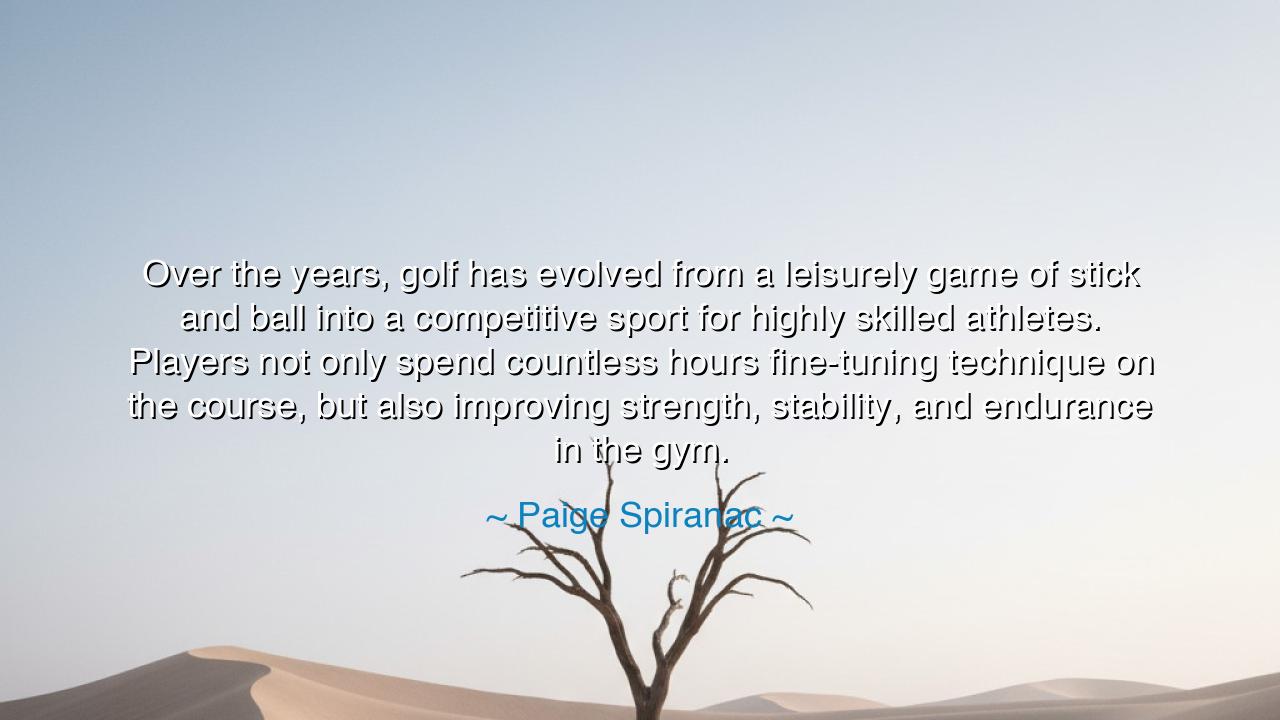
Over the years, golf has evolved from a leisurely game of stick
Over the years, golf has evolved from a leisurely game of stick and ball into a competitive sport for highly skilled athletes. Players not only spend countless hours fine-tuning technique on the course, but also improving strength, stability, and endurance in the gym.






The modern athlete and voice of the game, Paige Spiranac, once declared: “Over the years, golf has evolved from a leisurely game of stick and ball into a competitive sport for highly skilled athletes. Players not only spend countless hours fine-tuning technique on the course, but also improving strength, stability, and endurance in the gym.” These words, though spoken of golf, echo the eternal rhythm of human endeavor: that what begins as simple play can, through discipline and passion, be elevated into an art of power and precision.
To understand this, one must look back to the origins of golf, born on the windswept coasts of Scotland, where shepherds struck stones with wooden sticks across the fields. It was once a pastime, a game of leisure, a contest of wit and patience rather than of body and will. Yet as centuries passed, the game transformed. No longer is it merely a stroll upon green fields; it has become a battleground where discipline of muscle, mind, and spirit are tested to their limits.
Spiranac’s words remind us that technique alone is not enough. The player of old depended only on the stroke of the club and the measure of the eye. But the modern champion must train like a warrior. In the quiet halls of the gym, they forge strength in their limbs, stability in their core, and endurance in their lungs. For the swing of the club is not mere elegance — it is an act of force guided by control, requiring a body honed as finely as the instrument it wields.
History offers us a striking example in Tiger Woods. Before his rise, many viewed golf as a gentleman’s game of patience and finesse, untouched by the rigorous athleticism of other sports. But Woods transformed the landscape, blending unmatched technique with the strength and conditioning of a true athlete. His dominance showed the world that golf was not only a game of skill, but of physical power, mental resilience, and relentless training. He embodied the very evolution Spiranac describes: from leisurely pastime to competitive sport demanding the fullest measure of human capability.
This evolution of golf mirrors the evolution of humanity itself. What begins as play, as simple motion, becomes through dedication something far greater. The child who plays with paint may become a master painter. The one who hums a tune may become a composer. And the shepherd who strikes a stone upon the field may give rise to a lineage of athletes who command stadiums with their craft. It is in the discipline of practice, in the humility of training, that greatness is forged.
The lesson here is clear: in whatever path you choose, treat your work not as a pastime alone, but as an arena for mastery. Do not be content with the surface of skill; strengthen your body, steady your mind, endure in your spirit. For the victories of life belong not to those who dabble, but to those who commit themselves wholly, body and soul, to their craft.
Practical wisdom follows: rise each day with the resolve to refine yourself. If your craft demands precision, work also on strength. If it demands endurance, work also on calmness. Balance your training of body with the training of mind. In this way, you will grow into not merely a participant, but a master — one who transforms play into art, and leisure into legacy.
So remember, O listener, the words of Paige Spiranac: “Golf has evolved… players fine-tune technique and also improve strength, stability, and endurance.” Let this be your guide not only in sport, but in life. For all things evolve, and those who rise with them, who refine themselves with every season, will stand tall — not as mere players of the game, but as champions of the human spirit.






AAdministratorAdministrator
Welcome, honored guests. Please leave a comment, we will respond soon